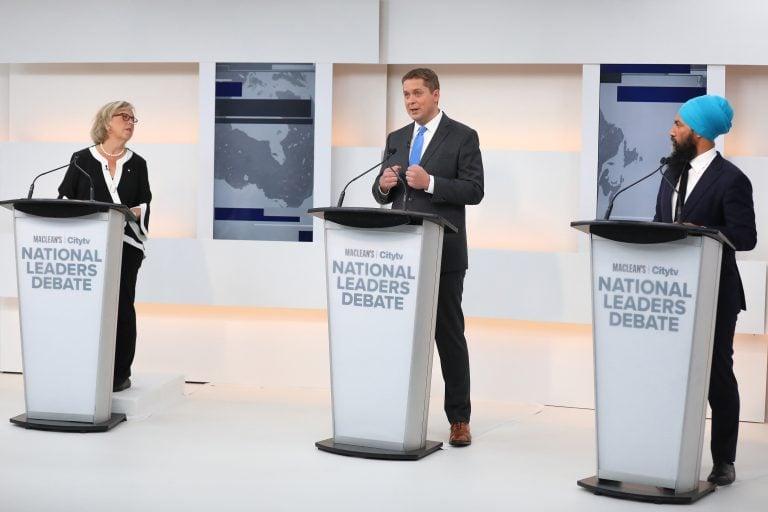Starting at the end: the closing statements tell a lot about tonight’s debate
Scheer aimed to highlight trust-plus-affordabilty, while May declared the status quo obsolete. But Singh hit his marks most consistently with his focus on fighting the power.

Maclean’s and Citytv Federal Leaders Debate in Toronto, featuring Elizabeth May, Jagmeet Singh, and Andrew Scheer. (Photograph by Cole Burston)
Share
One way to try to make sense of tonight’s federal leader’s debate is to start at the end. All three of the combatants got a chance to give brief closing remarks—their easiest chance all night to make the points they wanted viewers to remember, unconstrained by having to at least feign at answering moderator Paul Wells’s questions, and undistracted by sniping from their rivals.
So the way they summed up is the best guide to what they must have strategized at the outset about focusing on through the course of the debate.
Green Leader Elizabeth May wrapped up by checking off a policy list that includes universal pharmacare, affordable housing and eliminating university tuition. But mainly she tried to present herself as a clean break from conventional leadership. “The time for status quo decision-making is over,” she declared.
Closing remarks from @ElizabethMay: “The time for status quo decision making is over.” #elxn43 #cdnpoli #firstdebate pic.twitter.com/tPyRXP8bqc
— Maclean’s Magazine (@macleans) September 13, 2019
Conservative Andrew Scheer took his moment to take aim at Justin Trudeau—who gave the debate a miss—saying the Liberal leader “has broken his promises, broken the law, and lied to Canadians about it.” But Scheer also tried something a little trickier—welding that issue of trust (his leadership pitch) to targeted tax cuts (his core policy offer). He proposed a ballot question: “Who do you trust to make life affordable so you can get ahead?”
.@AndrewScheer's closing statement: "Life is getting more expensive and Justin Trudeau is making it worse." #cdnpoli #elxn43 #firstdebate pic.twitter.com/wx6eqj1YMG
— Maclean’s Magazine (@macleans) September 13, 2019
Drawing the chance to speak last, which isn’t a bad slot, NDP Leader Jagmeet Singh’s cadence seemed most natural, his flow least rehearsed. Like May, he rhymed off priorities like affordable housing and “pharmacare for all.” But, in old-school NDP fashion, he took aim at corporate bad guys like “big pharma.” If May suggested a break with the past, Singh reverted to the familiar left-wing formula of powerless against powerful. “Who is going to fight for you?” he asked. “Who is going to stand up for you?”
Jagmeet Singh's final statement of the #firstdebate #cdnpoli #elxn43 pic.twitter.com/dj2JPVasln
— Maclean’s Magazine (@macleans) September 13, 2019
But the question isn’t how these closing rallying cries landed as set-pieces; it’s how well they encapsulated what came before in the cut-and-thrust of what was a lively debate. To my ear, Singh had come closest to injecting his preferred themes into the give-and-take regularly through the contest. For instance, there was this chippy exchange between Singh and Scheer over the NDP leader’s claim that, under former prime minister Stephen Harper, the Conservatives brought in tax cuts favoured the rich:
Singh: “Your government has consistently in the past benefited the wealthiest—”
Scheer: “That’s just not true.”
Singh: “Mr. Trudeau has done the same thing—”
Scheer: “Low-income earners benefited the most from our tax cuts. That is a fact that comes from the Parliamentary Budget officer.”
Singh: “I didn’t cut you off when you were talking.”
Scheer: “I didn’t say things that weren’t true.”
Let’s call that one a draw. Still, even as Scheer was giving as good as he got, he’d clearly been forced onto the defensive, and his tax-cuts theme was being muddied. As well, in a debate in which Scheer was clearly striving to make the absent Trudeau his prime target—rather than really mixing it up with the two other leaders who are, after all, vying for third place in this race—he was drawn fully into the in-studio fray. As for Scheer’s preferred subject matter—the affordability-plus-trust combo pack he wrapped up in his closing—that really didn’t feature prominently through the night.
As for May, in a sense her exclamation point about breaking with the status quo decision-making did, in fact, nicely punctuate some of her more unconventional debating moments. That might not be a good thing, though. At one point, she sketched an oddball idea about SNC-Lavalin being forced to build infrastructure on a non-profit basis. Later, she floated the novel notion that any Quebecers who lose public sector jobs because of the province’s controversial Bill 21 might be offered employment elsewhere in Canada.
If we take the leaders’ closing statements as genuine signals of what they were hoping would transpire before they got to them, Singh seems to have hit his marks most consistently, while Scheer was forced to debate on ground he would have preferred to sidestep, and May might have conveyed a status-quo-defying sensibility, but perhaps not in the way she’d planned.
WATCH THE DEBATE: National Leaders Debate 2019: Full replay | Maclean’s and Citytv